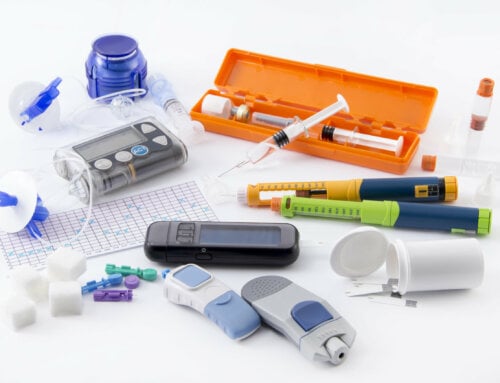Getting sick during the winter months tends to happen more frequently – especially when you have a chronic illness like diabetes. Windows are closed, people stay indoors and germs seem to linger. Flu season is at its height and lasts through the end of February. Extreme changes in temperature, busy schedules and daily stress just make it worse. Let’s look at simple ways to help keep you healthy all winter long.
Reduce inflammation
Inflammation is known to have an affect on everything from the common cold, to the flu, to chronic diseases. When inflammation is reduced or limited, your body is able to fight off infections and diseases more efficiently. The body responds to germs and irritants by becoming inflamed – which is a natural response. Inflammation can help repair and speed up healing, but a large inflammatory response can cause additional problems. Germs can cause inflammation as well as the lack of sleep and exercise. Poor nutritional choices can increase inflammation. This leads to more infections and disease. Even daily periods of stress causing surging cortisol levels can decrease immunity.
Hand washing
It is one of the simplest ways to help keep you germ free and healthy. Do it often and do it correctly. Using soap and water is still the most efficient way. Watch public restrooms, shared computers and phones, door knobs and handling money. Forget about shaking hands. Try to get fresh air indoors (even when chilly) and keep your hands away from your face – especially your eyes, nose and mouth. Even hugging may increase risk of air borne germs.
Eating to Increase Immunity.

Eat lean protein including lean meat, chicken and fish along with low fat dairy. Include yogurt which contains live cultures. Probiotics or live cultures may increase your immune system and help fight disease – especially Lactobacillus reuteri; this culture has been shown to stimulate white blood cells which fight infections.
Sip chicken soup like our mothers suggested to help fight off germs. The warm broth is soothing, the salt helps keep the nose clear by thinning the mucus, the chicken gives us protein and the noodles or rice provides added energy. Either homemade or store bought seems to do the trick. Cook with onions and garlic which are plentiful during the winter months for an immunity boost. They contain natural antioxidants, which help ward off bacteria and viruses – this can reduce your chance of infection.
The immune properties of garlic and onions are most potent when eaten raw. Mushrooms have anti-bacterial and anti-viral properties, and may even have tumor fighting abilities. They contain selenium, copper, fiber, B vitamins and taste delicious in stews, stir-fry and crock pot recipes. Mushrooms also contain vitamin D which can strengthen immunity. Include Shiitake and Reishi mushrooms for the most benefits with a strong meaty flavor. Add brown rice and other whole grains (watch the portion size) for magnesium, which lowers blood pressure and washes stress levels by reducing cortisol.
Eat citrus foods (oranges, grapefruits, lemons and limes) since they contain flavonoids to keep you healthy. Citrus foods have fiber, potassium and folic acid. Include sweet potatoes, butternut squash and kiwi for high levels of vitamin C which helps fight colds and infections. Look for foods containing or supplemented with vitamin D (milk and yogurt) for immunity.
Limit saturated fats, trans-fats and sugar – these increase inflammation and can cause illness. Hot tea can soothe throat irritation and offers polyphenols, flavonoids and catechins which can destroy free radicals and increase immunity. All teas are beneficial, but black and green tea are the most helpful. Avoid alcohol – it can reduce white blood cells and decrease immunity. Mono-unsaturated fats (including olive oil and nuts) can boost immune function. Add a handful of nuts for more vitamin B to help with stress. Grate fresh ginger into recipes or warm drinks since it is an anti-inflammatory. There are so many ways that food choices can boost your immunity and keep you healthy.
Activity
Daily moderate exercise seems to decrease the risk of upper respiratory infections. Moderate exercise can lower inflammation and stress hormones. Mix up your routine with strength training and aerobics for best results. Extremely high intensity exercise, such as running a marathon, can actually increase free radicals and inflammation – so watch the intensity.
Decrease Stress
We all have it, but learning to deal with it better can bolster your immune system. Stress causes a hormonal release and wears down your body. Focus on what you can change and eliminate thoughts of what you can’t. When in traffic, listen to music, books on tape or deep breathe. Deep breathing slows your heart rate, blood pressure and helps reduce the stress response. It makes the arteries dilate for improved blood flow. Even laughing can reduce the stress response and boost your immunity. Talk over your problems but limit the dialogue to 10 minutes, and move on – especially if you can’t change it. Refocus your energy to positive things and thoughts.
Try Supplements

Rest and Sleep
Try to sleep between 7-9 hours a night. Each person may require a different amount but this seems to be the sweet spot to reduce the risk of heart disease and infections. Research shows more than 9 hours or less than 6 hours may have detrimental effects on your immunity. Your body repairs during sleep which is necessary for a high functioning immune system. Try to sleep in a cool dark room and do not eat, drink or exercise for at least 2 hours prior to bed.
Staying healthy is within reach when you make some easy changes this winter season. Stay strong and warm and enjoy the change of seasons!
Have a question or comment? Post below or email me at [email protected] if you would like to share them with ADW diabetes.
NOTE: Consult your Doctor first to make sure my recommendations fit your special health needs.







Roberta,
Many thanks for another excellent article, especially at this time of the year!!!
Concise and yet extremely apropos.